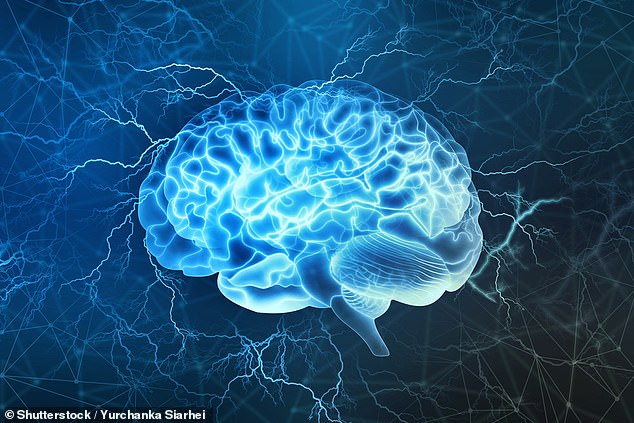Struggle with maths? Scientists say zapping the BRAIN can improve your skills
- Only worked for people with low brain cell activity in a certain brain region
- It may not boost those already blessed with math skills, scientists say
Brain zapping can help people who struggle with math get better at math.
Researchers gave 102 people a series of tricky math problems, each of which required them to multiply a two-digit number by a one-digit number, such as 16 x 3 = 48.
Half of the people in the study had their brains zapped with a mild electrical current to stimulate their brain cells.
People who received the brain stimulation and were also tested under more difficult learning conditions answered the questions in about half the time, compared to people whose brains weren’t zapped, researchers claim.
They reportedly got answers 52 percent faster.
Brain zapping may help people who struggle with math get better at math (file photo)
But the technique only worked for people with low brain cell activity in a part of their brain called the dorsolateral prefrontal cortex when they were trying to solve math problems.
Previous research shows that these are people who have difficulty with math.
This suggests that an electrical current to the brain may help people who perform poorly in math get better, but may not boost those already blessed with math skills.
Roi Cohen Kadosh, lead author of the study, and professor of cognitive neuroscience at the University of Surrey, said: ‘What we found is how this promising neurostimulation works and under what circumstances the stimulation protocol is most effective.
“This discovery could pave the way for a more tailored approach to one’s learning journey.”
It has previously been shown that electrical stimulation can boost memory and learning.
But the new study wanted to understand how this works, for whom and under what learning conditions.

The results suggest that brain stimulation helps people answer math questions faster by stimulating their brain cells – perhaps turning on brain chemicals that make brain cells active, or turning on the chemicals that keep them inactive (file photo)
The 102 volunteers wore a cap containing two electrodes to zap their brains, while another thirty electrodes measured their brain activity.
The results suggest that brain stimulation helps people answer math questions faster by stimulating their brain cells — perhaps turning on brain chemicals that make brain cells active, or lowering the chemicals that keep them inactive.
The study gave half of the volunteers brain stimulation, while the other half received a ‘sham’ weak electrical current, which produced the same tingling sensation but did not affect the brain cells.
But also when it came to the structure of the math questions, both groups were split in two.
Half of each group was given a series of problems with more repeated questions so that they could simply remember the answers.
The brain stimulation did not significantly increase these people’s math skills — although it did work for the other people in each group, given a set of problems with less repetitive questions.
The study, published in the journal PLOS Biologytherefore suggests that people need to be less than excellent at math, as well as being challenged by math problems, in order to benefit from their brain zapping.
